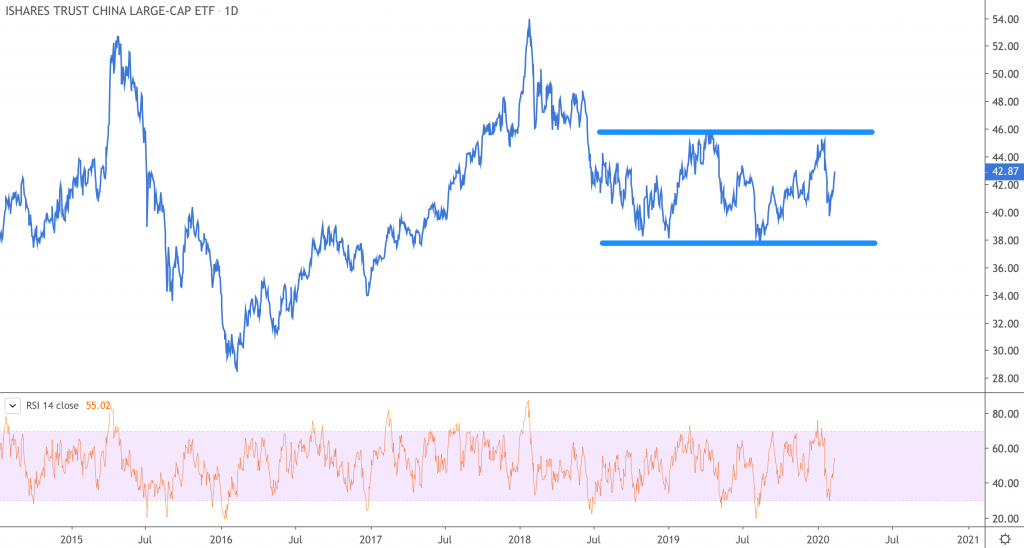This group of stocks has been facing mighty headwinds recently, but the technical picture says the group is gearing up to surge higher.
China’s Hubei province reported on Wednesday an additional 242 deaths and 14,840 new cases of COVID-19, the official name for the novel coronavirus.
The figure is a sharp increase from Tuesday’s figures and marks the largest one-day increase recorded thus far during the outbreak. These new numbers bring the total death toll from the virus to 1,310 and the total number of those with COVID-19 to 48,206 as of Wednesday evening.
Beyond China, the Centers for Disease Control and Prevention said today that it is preparing for the virus to “take a foothold in the U.S.” Dr. Nancy Messonnier, director of the CDC’s National Center for Immunization and Respiratory Diseases said to reporters, “At some point, we are likely to see community spread in the U.S. or in other countries,” adding that “this will trigger a change in our response strategy.”
Then International Monetary Fund Managing Director Kristalina Georgieva told CNBC that COVID-19 is “clearly more impactful” on the world economy than the SARS outbreak of 2002 – 2003 when China only accounted for 8% of the global economy.
“China was different [back then], the world was different,” Georgieva said. “Today, China manufactures 28%, with possible impact through value chains on other countries.”
As the headlines continue to paint a bleak picture of the COVID-19 outbreak, Chinese stocks have struggled. But while the FXI China Large-Cap iShares ETF is down more than -4% in the last month and nearly -2% year-to-date, it appears this group of stocks is starting to stage a comeback.
The FXI gained 3.8% in the first two weeks of 2020, but the ETF then hit a high on January 13 before falling -12% by the end of the month. But since that bottom, the FXI has bounced back gaining just under 8% so far this month.
While the FXI—with its top holdings including Tencent Holdings (OTC: TCEHY), Xiaomi Corp. (OTC: XIACF), and China Mobile Limited (NYSE: CHL)—is still 7% below its 52-week high and off -41% from its all-time high reached in October 2007, one expert says its chart shows some encouraging signs.
“The FXI has been trading in a sideways range for 18 months, and it’s coming off an oversold condition,” said Miller Tabak chief market strategist Matt Maley.

“Now, if something with this coronavirus raises its ugly head again,… it could go back down and retest the lows of that. But I think on a longer-term basis, it looks quite good,” Maley added.
According to Maley, China’s ambitious five-year plan to flood its economy with liquidity particularly in the second half of 2020 will be good for Chinese stock.
“They’re going to pump in a lot of liquidity into the marketplace, into the system, in the second half of the year, and I think this group’s going to go higher by the second half of the year no matter what,” the strategist said. “The key [level] to watch here is if it can break above its kind of double-top high in the high $45s.”
Specifically, $45.75—6.7% above the current price—is the level investors should keep an eye on.
“[If] it breaks above that level, it’s going to take off from here and it’d be very, very bullish on a technical basis,” Maley noted.
Strategic Wealth Partners’ Mark Tepper believes we’re past the worst of COVID-19.
“It seems as if the worst is behind us as it relates to the headwinds that had been coming at us as far as trade and the coronavirus go,” Tepper said. “When you look throughout history, these pandemics tend to be short-term pullbacks and they tend to be buyable pullbacks. So,… if you identify certain Chinese stocks that you think are trading at a reasonable valuation, I think there’s a good opportunity to buy some of them right now.”
One of Tepper’s firm’s core holdings is Chinese e-commerce giant Alibaba (NYSE: BABA).
Alibaba is up just over 12% from its recent low from the end of January, but Tepper says the stock is “still one of my favorites.” And according to him, the stock is a good way to profit on China’s growing middle class.
“It is a way to play that rising middle-class consumer in China,” Tepper said. “As the middle class makes more and more money, they’re going to have more money to spend, and Alibaba is going to benefit. So, with Alibaba, you’re getting all the same businesses as Amazon (NASDAQ: AMZN), but it’s trading at a valuation discount to Amazon.”